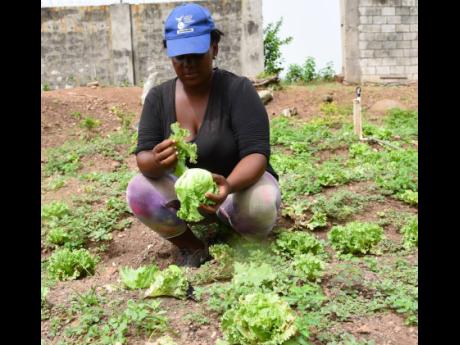Rocksprings Farm blooms against the odds
A small urban farm is springing some pleasant surprises – Rocksprings Farm off Windward Road, Kingston, in the vicinity of the Jamaica Flour Mills, is operated by a farm group comprised of young people. They said they are engaged around common interests of earning an income, improving their skills levels and playing their part in promoting environmental stewardship of the community in which they operate, and have been quietly making their mark.
With the Wareika Hills providing the backdrop for their farm, the group operates a piggery, does coconut water bottling, as well as honey processing/bottling, and cultivates a mix of vegetables – Romaine and iceberg lettuce, cabbage, pak choi and purple cabbage. They also rear goats, cows and sheep and cultivate plantains, and are harvesting their first crop of grapes from what they admit is a trial run.
All this they do on five acres of land leased from Rubis Energy Jamaica, as well as a section of community property with a core team of nine persons and three summer interns who are guided by Business Development Director Gavin Myers.
During a recent tour of the property, arranged by Camille Campbell, public relations officer, and Patrice Howell, CSR officer of the Jamaica Private Power Company (JPPC), The Gleaner got a close-up look at the farming operations of the group which has been working together since 2014. Their progress to date has been impressive, especially in light of the trying conditions under which they operate.
The piggery, with a certified abattoir and a 40-foot container converted into cold-storage facility, was our first stop, and then it was on to the reaping of iceberg lettuce, with our next stop at the recently constructed building to house their honey processing and bottling operation. This was financed through a grant from the Environmental Foundation of Jamaica, just one of the corporate entities which have been so impressed by the group’s showing, they have rewarded it’s efforts. They have also benefited from the kindness of the Digicel Foundation, the United States Agency for International Development, JPPC and their other neighbour, the Jamaica Flour Mills, to name a few.
BIODIGESTER
“We do intensive farming in a small space,” was how Myers summed up their undertaking. He was also proud to disclose that the animal waste is channelled into a fully functional and certified biodigester from which fertiliser is generated for use on the farm. The plan is to also capture methane gas from the biodigester and incorporate it into their processing facility.
The aim is to expand their vegetable cultivation to cover a much larger area, with the plants absorbing the excess nitrogen from the nearby pig waste and having zero impact on the environment. This is consistent with the long-term objectives of the farm group which promotes itself as a social enterprise entity, which Myers explained means that it works not only for financial gain but is heavily invested in the social and environmental health of neighbouring communities. The workers, he said, do more than just put in a day’s work and are in turn in rewarded with opportunities to upgrade their skills capacity, an opportunity which is extended to the members of the wider community.
“In our area we look at violence prevention, education and environmental protection,” Myers said.
OPERATIONAL COSTS
The farm harvests water from the source which the area derives its name – Rockspring – and so much of their operational cost for utilities are pretty much under control. However, with pork a major source of income, most of the profit goes right back into that operation, with Myers disclosing that can account for 60-70 per cent of their operational costs.
“We need some working capital and better access to markets, for right now we are just living hand to mouth. If we were able to sustainably ramp up our marketing and access low-interest capital and had access to a proper line of credit from our major suppliers, things would be much better for us. When we try to get access to credit, the rates and everything are onerous on us as small entrants in the market.
“The other thing is we also want an expansion in equipment, such as a good tiller and a power saw, and we would want a chaffing machine for us to be able to shred our goat feed. The other thing is if we can partner with our corporate suppliers to get a 60-day credit, it would work wonders for our bottom line because we do have an impressive range of products on offer – pork, goat meat and vegetables,” Myers said.
Despite these setbacks, the group enjoys a very good relationship with the neighbouring communities, for which it has a price point of at least 30 per cent below the cost at which it sells to other clients. The group is pressing ahead with its plans to emerge as a very serious contender in the marketplace. It is looking to computerise its record-keeping and build an office staffed with an administrative and marketing assistant in order to really promote Rocksprings Farm.
It is their willingness to keep striving against the odds that caught the eye of the JPPC, which has committed to pay the salary for two summer interns for at least three months in the first instance – from June-August.
“Rocksprings Farm’s 360-degree model of agriculture where nothing goes to waste inspired our sequence of corporate social responsibility activities: playing a part in developing the next generation of young farmers, facilitating a mutual relationship between Rockfort residents and businesses, and contributing to the economic development of this small, urban farm with immeasurable potential. After this phase, we hope to create an educational tie-in with the implementation of ‘backyard’ vegetable gardens at the basic schools in our school-feeding programme, to teach students about the environment, food sustainability and self-reliance,” Campbell said.

